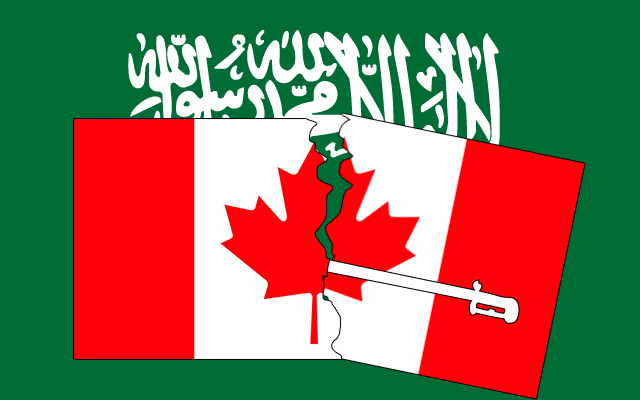August 08, 2018
In recent days, the Kingdom of Saudi Arabia has thrown a fit with Canada. Riyadh has kicked out the Canadian ambassador, recalled its own envoy, cancelled flights between the two countries, and put a freeze on new bilateral trade and investment. A pro-government youth club went so far as to post (but then remove) an image that seemed to threaten Canada with a 9/11 style terrorist attack.
The reason for the blowup? Canada’s call for the release of recently-jailed activist Samar Badawi. Badawi is an outspoken champion of women’s rights who has also campaigned for the release of her brother Raif, a blogger sentenced in 2014 to a thousand lashes and ten years in jail for “insulting Islam through electronic channels.”By the standards of the old pantomime act in which Western governments criticize Saudi Arabia’s appalling human rights record but more or less leave the energy-rich and strategically aligned kingdom alone, Canada’s statement hardly stands out.
So why the furious response?
First, there’s a domestic angle. Saudi Arabia’s young Crown Prince Mohamed Bin Salman is liberalizing parts of Saudi society as part of a broader bid to attract foreign investment and reduce his country’s dependence on oil revenues.
But as part of that plan, he’s staged a power grab and crushed dissent to minimize challenges from rival princes or from conservative circles who hate what he’s up to. This, for example, explains why Prince Mohamed sees no contradiction in allowing women to drive while also arresting the women who have campaigned for allowing women to drive.
By lashing out at Canada – a country big enough to matter, but small enough not to risk any serious fallout – he is sending a signal: external criticism is now just as off-limits as internal criticism.
Second, there’s an external angle: the Trump effect. Just to be clear, the US has never – under any administration -- really put the screws to Saudi Arabia (or any other Sunni Arab allies) over human rights. But no modern US President has been as unapologetically uninterested in human rights issues as Donald Trump.
At the same time, Trump has signaled he is firmly in Saudi Arabia’s corner when it comes to the Kingdom’s key foreign policy objective, which is to crush Iran. Where Obama’s embrace of the Arab Spring and the Islamic Republic raised fears in Riyadh, Trump has set the House of Saud at ease.
Will Trump intervene on behalf of “very weak and dishonest” Justin Trudeau? Doubtful. And while Ottawa and Riyadh will probably eventually work this all out, other authoritarians will surely take notice that on Trump’s watch there’s room to be tougher at home and pricklier abroad.
More For You
People in support of former South Korean President Yoon Suk Yeol rally near Seoul Central District Court in Seoul on Feb. 19, 2026. The court sentenced him to life imprisonment the same day for leading an insurrection with his short-lived declaration of martial law in December 2024.
Kyodo
65: The age of former South Korean President Yoon Suk Yeol, who was sentenced to life in prison on Thursday after being found guilty of plotting an insurrection when he declared martial law in 2024.
Most Popular
In an era when geopolitics can feel overwhelming and remote, sometimes the best messengers are made of felt and foam.
Hungarian Prime Minister Viktor Orban holds an international press conference in Budapest, Hungary, January 5, 2026.
REUTERS/Bernadett Szabo/File Photo
The Hungarian election is off to the races, and nationalist Prime Minister Viktor Orbán is facing his most serious challenger in 16 years.
How people in G7 and BRICS countries think their policies will effect future generations.
Eileen Zhang
Does skepticism rule the day in politics? Public opinion data collected as part of the Munich Security Conference’s annual report found that large shares of respondents in G7 and several BRICS countries believed their governments’ policies would leave future generations worse off.
© 2025 GZERO Media. All Rights Reserved | A Eurasia Group media company.
